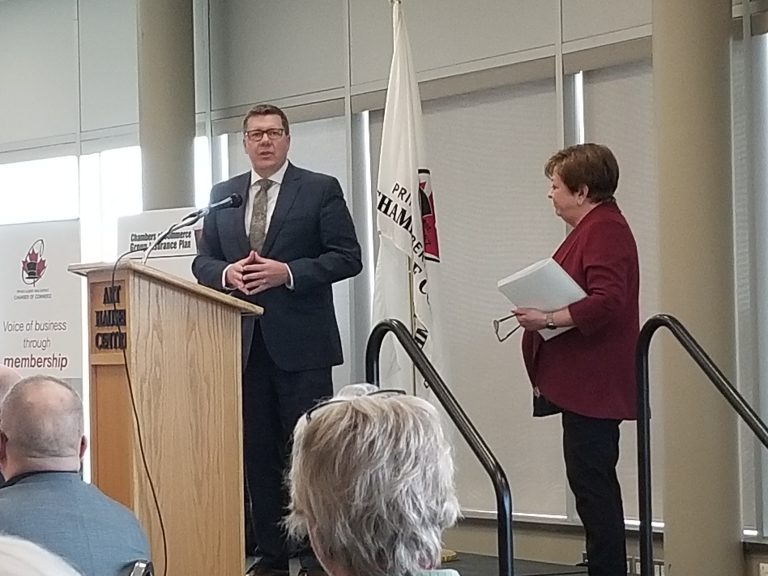
Premier Scott Moe fielded questions on retaining nurses, highway infrastructure and the federal budget during the Prince Albert and District Chamber of Commerce luncheon on Friday.
Moe and finance minister Donna Harpauer took questions for roughly 40 minutes from a packed house at the Ches Leach Lounge inside the Art Hauser Centre. Moe used the opportunity to tout Saskatchewan trade opportunities abroad in light of the Russian invasion of Ukraine.
Moe said Europe could face a food and energy shortage due to the conflict, and believes Saskatchewan can secure serious long-term trade deals if the government moves quickly.
“There are some real questions being asked (in Europe) and some soul searching as they look in the mirror to answering these two questions Saskatchewan has a great answer too,” Moe told attendees. “The first is, where are you buying your stuff from? Where are you buying your energy from, where are you buying your food from, where are you buying whatever you need from, and why are you buying from them or there? Are they a trustworthy, stable trading partner, and will they be there next year for you and the year after that, and five and 10 years down the road. Well, Canada and Saskatchewan, of course we will.”
“Buy it from somebody who isn’t just in it for one year, and might invade you the next,” he added. ”Buy it from somebody who wants to trade with you for decades to come.”
Moe said Saskatchewan not only has plenty of resources to sell, it provides them in an environmentally sustainable way. He argued the province’s uranium, agri-food, and forestry products are among the most sustainable in the world, and said the world will take that into account when choosing where to buy from.
The province faced steep criticism for the environmental aspect of its 2022-23 budget, which included $1-million for Saskatchewan’s climate change strategy. The most recent National Inventory Report on greenhouse gas emissions shows Saskatchewan’s increased by one megaton from 2018 to 2019.
Moe said he’s not bothered by criticism of their environmental record.
“A lot of folks will come to me and say, ‘hey, you guys have the highest carbon emissions per capita.’ I don’t care,” Moe said. “We have the highest exports per capita in Canada as well. We make the cleanest products, and then we send it to over 150 countries around the world. This province is most certainly a part of the solution when it comes to a cleaner, greener economy. We’re part of the solution to your energy security issues. We’re part of the solution when it comes to your food security issues.”
Moe acknowledged it’s been a difficult two years for Saskatchewan business, but said good times are ahead. The premier just returned from a trip to Europe to promote Saskatchewan’s trade interests, and said provincial government representatives will fan out to do the same over the next few months.
Moe faced two questions from Chamber CEO Patty Hughes before taking questions from the audience.
The first came from a local registered nurse, who asked about a recent Saskatchewan Union of Nurses survey which showed roughly three out of every five nurses thought about quitting over the past 12 months.
Moe responded by touting the province’s efforts to attract more nurses from outside the province. Those efforts include a recent delegation to the Philippines, something the province has done before to attract more nurses.
When asked during a media scrum afterwards what the province would do to keep nurses currently working in Saskatchewan from leaving, Moe said ending the emergency orders would reduce the stress on healthcare workers by allowing them to return to their traditional place of employment.
He said the province had some significantly-sized testing stations and vaccination clinics, which are nowhere near as large as they used to be, which would also reduce the strain.
He also said ICU units weren’t as full as they were during the Delta wave, which will also reduce the strain.
As of March 30, Saskatchewan has 120 patients in hospital with COVID-related illnesses, and another 184 with incidental COVID-19 infections. Those numbers include 21 COVID patients in ICUs.
Moe added that it’s also important for nurses to know help is one the way, which is why recruiting efforts are underway.
“We do see some initial support,” he said. “Will it be enough? I hope so. I’m sure there are still going to be some areas that are challenged for a period of time, and then we most certainly are moving and moving quickly to support our healthcare services and those working in our healthcare system.”
